
About Andrew Cusack
 Writer, web designer, etc.; born in New York; educated in Argentina, Scotland, and South Africa; now based in London.
Writer, web designer, etc.; born in New York; educated in Argentina, Scotland, and South Africa; now based in London. read more
News
Blogs
Reviews & Periodicals
Arts & Design
World
France
Mitteleuropa
Knickerbockers
Argentina
The Levant
Africa
Cape of Good Hope
Netherlands
Scandinavia
Québec
India
Muscovy
Germany
Academica
The Café Society of Ferenc Molnár
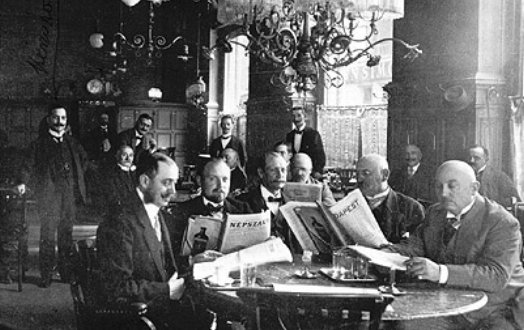
FROM 1887, the Café Central (or Centrál Kávéház, in Magyar) has been a meeting place for artists, intellectuals, professionals, and others located on Budapest’s Károlyi Mihály street. One of its most famous patrons was the novelist and dramatist Ferenc Molnár (born Ferenc Neumann and often anglicized as Franz Molnar), whose 1906 book The Paul Street Boys is perhaps the most widely-read Hungarian novel. His 1909 play “Liliom” was later adapted by Rodgers and Hammerstein into the musical “Carousel”. Both his plays “The Guardsman” and “The Swan” were later made into films (the latter being Grace Kelly’s final appearance on the silver screen), while “The Play at the Castle” was adapted by P.G. Wodehouse into “The Play’s the Thing” and by Tom Stoppard into “Rough Crossing”.
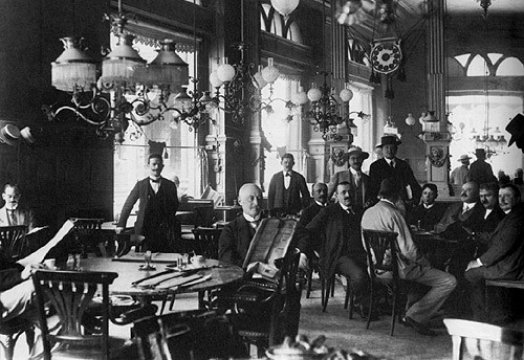
During the bloody revolt of the socialist Béla Kun in 1919, thugs roamed the streets of Budapest unchallenged, and for safety’s sake many refused to go out at night unless in a suitably large group of people. Molnár for the most part chose to stay at home, but nonetheless encouraged his friends to visit him. One night, a few friends arrived at his house accompanied by a very large man as a security precaution. Molnár gave him a worrying look for much of the evening and when it came time for his friends to depart, Molnár shooks hands with the giant man, asking him “Aren’t you afraid to go home by yourself? Aren’t you terribly afraid that you’ll attack somebody?”
On another occasion, a friend arrived at Molnár’s just as the playwright was readying for bed. He observed Molnár taking off his slippers and placing them by his bed, the one facing the other, toe-to-toe. The visitor inquired the meaning of this ritual. “You see,” Molnár replied, “if you put them side by side, both staring straight ahead, they look like a married couple who have just had words. It depresses me. But see how friendly they look nose to nose! They cheer me up and I sleep better.”
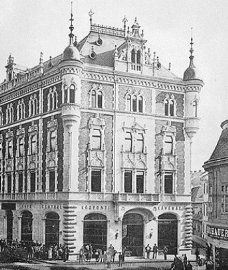 After Kun had been overthrown and peace was restored to Budapest, Molnár was holding court at the Centrál as per usual when his American agent came to Budapest, desperate to bring Molnár to New York (where his play “Liliom” was proving a tremendous success). Molnár, who was not a huge fan of travel, would not budge, claiming that the idea of the journey alone filled him with dread. His agent tried to assure Molnár that he would travel first-class in the highest comfort: first across Europe on the Orient Express, then to America on a luxury passenger ship. Molnár remonstrated, “But what about the journey from this café to the railway station?”
After Kun had been overthrown and peace was restored to Budapest, Molnár was holding court at the Centrál as per usual when his American agent came to Budapest, desperate to bring Molnár to New York (where his play “Liliom” was proving a tremendous success). Molnár, who was not a huge fan of travel, would not budge, claiming that the idea of the journey alone filled him with dread. His agent tried to assure Molnár that he would travel first-class in the highest comfort: first across Europe on the Orient Express, then to America on a luxury passenger ship. Molnár remonstrated, “But what about the journey from this café to the railway station?”
Feuds and spats are often rife in the literary world, and Molnár’s life was no exception. He used to say of his rival, the unusually thin journalist Felecki, that “when Felecki was born, the midwife kept the umbilical cord and threw away the baby”. Late rising is another frequent characteristic of the literary life, and true to form Molnár rarely ever rose before noon. There was one instance, however, when circumstances induced him to arise not only before noon but indeed even earlier in the morning. Molnár had been summoned to appear as a witness in a lawsuit in Budapest and was ordered to present himself at the court at 9:00 am. Chiefly thanks to the workings of his servants, he duly rose and dressed and was pressed out of the house by a half-hour before the appointed time. Astounded by the masses of citizens on their way to work, the first rush hour he had ever witnessed, Molnár exclaimed “Good heavens! Are all these people witnesses in this damned case?”
Later in the 1920s, Molnár left Budapest for Vienna, where he lived comfortably in a hotel. A significant number of related Molnárs came to visit the flourishing dramatist in Vienna, no doubt in the hopes of enjoying some of the fruits of their kinsman’s success. Suspecting they would not be received with open arms, they were pleasantly surprised when Ferenc welcomed them with great kindness and affection. He even demanded that a group photograph be taken to commemorate the visit. When the print of the photograph was prepared, Molnár handed it to his doorman, instructing “whenever you see any of the persons in the picture trying to get into the hotel, don’t let them in!”
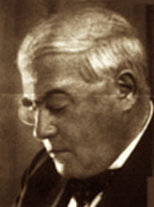 One evening in Vienna, Molnár was invited to the house of a prominent politician for a party at which the acclaimed Austrian tenor Richard Tauber was singing. The playwright was enjoying the evening immensely until, with a cigar in one hand, he reached the other around the waist of the agreeable-looking hostess. It was then that her husband crossed the room determinedly and in a low voice spoke: “Herr Molnár, may I see you in private?” With increasing woe, Molnár stepped into the neighboring room with the host. “Herr Molnár,” he gravely said, “I must ask you not to smoke while Herr Tauber is singing; it is bad for his throat”.
One evening in Vienna, Molnár was invited to the house of a prominent politician for a party at which the acclaimed Austrian tenor Richard Tauber was singing. The playwright was enjoying the evening immensely until, with a cigar in one hand, he reached the other around the waist of the agreeable-looking hostess. It was then that her husband crossed the room determinedly and in a low voice spoke: “Herr Molnár, may I see you in private?” With increasing woe, Molnár stepped into the neighboring room with the host. “Herr Molnár,” he gravely said, “I must ask you not to smoke while Herr Tauber is singing; it is bad for his throat”.
The changing political situation meant it became impossible for Molnár (who was of Jewish extraction) to remain in Vienna nor to return to Budapest. He fled to New York, as did so many European intellectuals of the day. One day a group of assembled exiled Hungarians were discussing the first phrases they learned in English as they became more acclimatized to Manhattan living. After the predictable “Hellos”, “Goodbyes”, and “Good mornings” were mentioned, Molnár finally interjected “The first sentence I learned was ‘Separate checks, please!'”
While fascism forced him into exile, the rise of communism prevented Molnár from returning home to Budapest, and he died in New York in 1952. In 1949, when the socialist regime nationalised all private enterprise, the old Café Central was shut and the site became a cafeteria for subway workers, later becoming an amusement arcade. More recently, it was purchased by local entrepreneur Imre Somody and restored. Providentially, this old haunt of Ferenc Molnár (not to mention numerous other Hungarian intellectuals) is now returned to its former glory as one of the most prominent coffee houses in the Pearl of the Danube.
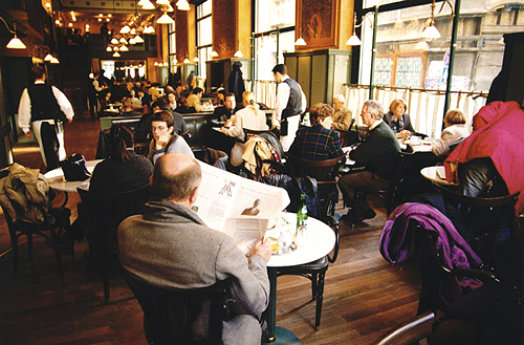
Search
Instagram: @andcusack
Click here for my Instagram photos.Most Recent Posts
- Patrick in Parliament March 18, 2024
- Articles of Note: 13 March 2024 March 13, 2024
- Cambridge March 9, 2024
- Taken on Trust March 4, 2024
- Immanuel on the Green March 2, 2024
Most Recent Comments
Book Wishlist
Monthly Archives
Categories



I believe he used violet ink for writing and that he wrote both Hungarian and German versions of his plays. He, surprisingly, thougtht that some of the changes to “Liliom” in “Carousel” were improvements.
The book to read for this era is “Budapest 1900” by Lukacs.
Was there ever a civilization like that of the Habsburg lands? From Krummau to the Central Café, and everywhere in between: a joi de vivre that even the originators of the phrase never knew.
Thanks to Mark R for the tip on the Lukacs book. I’m trying to learn about Molnar and Janos Vaszary and their Budapest contexts, so I am happy for the information.
Does anyone know the names of Ferenc’ brothers and/or sisters? I think one brother’s name is Sandor. Both were sons of von Neuman and changed their names to Molnar. Please email to me at lgreeley@bu.edu. Thank you.
L Greeley’s information is totally incorrect. Ferenc Molnár did not have a brother named Sándor and his parents name is not “von Neumann”.
Qui connait le nom de la mère de Férenc MOLNAR ?
Jozefa Wallfisch [my gggrandmother]